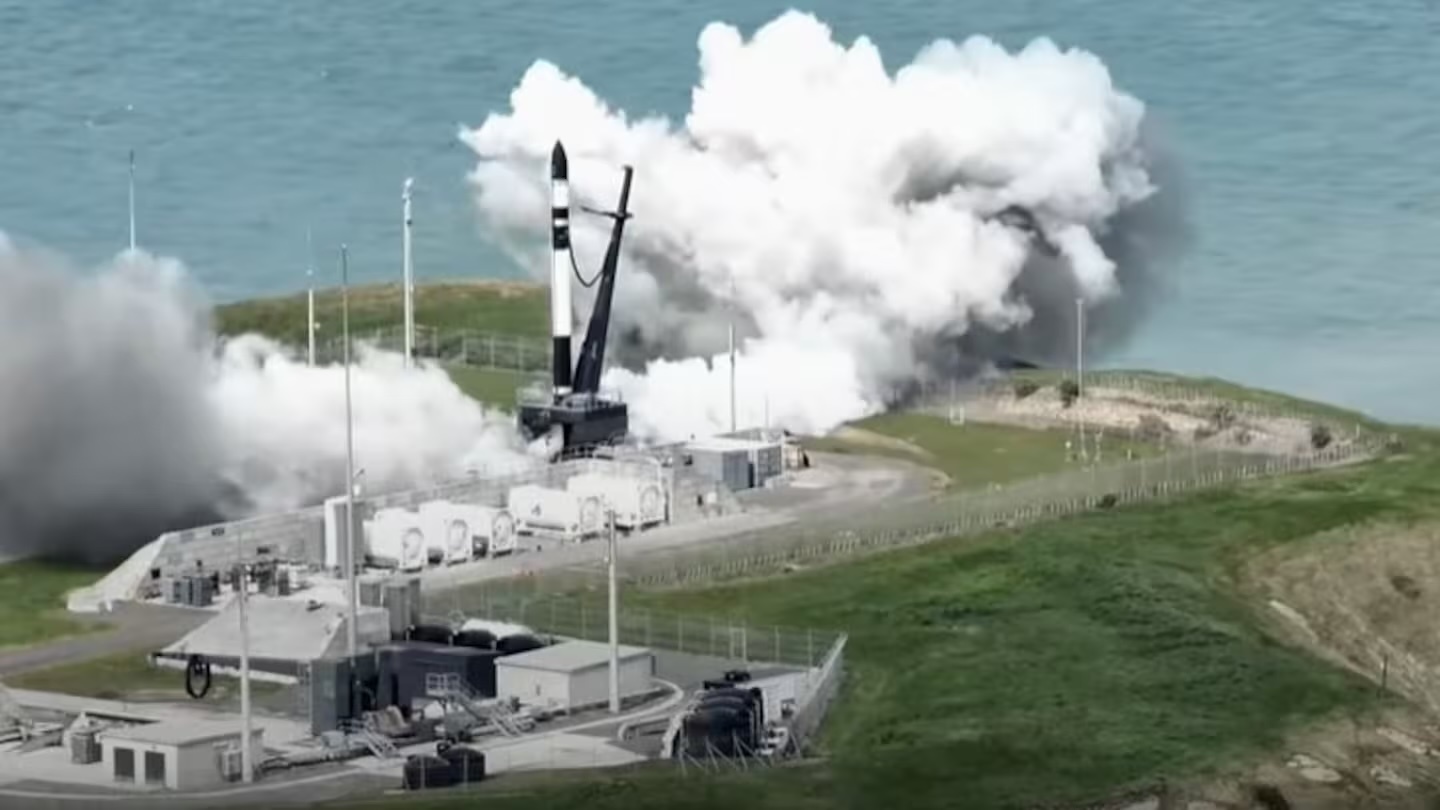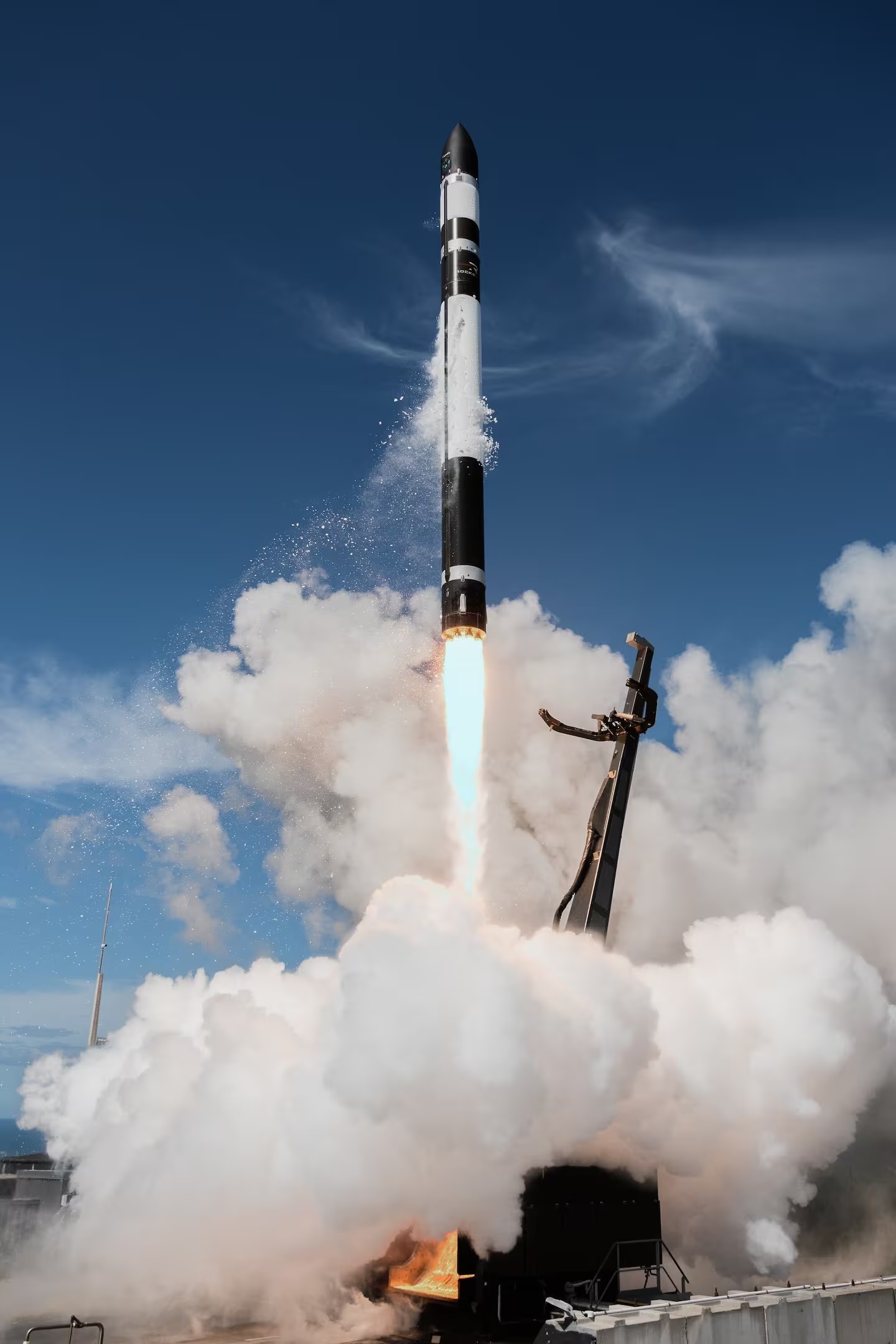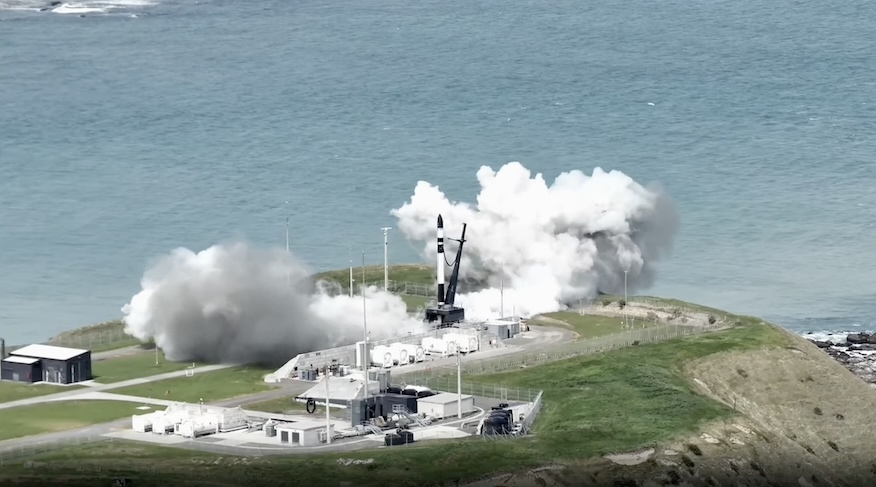Update: 19.09.2024
.
Rocket Lab’s Electron rocket experiences abort as its Rutherford engines began firing, prior to liftoff
Right before Rocket Lab’s 53rd Electron rocket lifted off from its Launch Complex-1 in Mahia, New Zealand, the vehicle experienced a T-0 abort. The engines began firing as expected at T-2 seconds, but the vehicle remained on the pad. Image: Rocket Lab via launch livestream
Update Sept. 18, 9:47 p.m. EDT: Rocket Lab noted the scrub was due to “a ground systems sensor trigger.”
Rocket Lab had to stand down from launching its 53rd Electron rocket on a mission for the France-based Internet of Things company, Kinéis. The rocket aborted prior to liftoff after the nine Rutherford engines began firing about two seconds prior.
The mission, dubbed ‘Kinéis Killed the RadIOT Star’ by Rocket Lab, was set to launch from Launch Complex 1 Pad A on Sept. 19 at 11 a.m. NZST (Sept. 18 at 7 p.m. EDT, 2300 UTC). Because it was an instantaneous launch window, Rocket Lab had to pivot from further launch attempts on Thursday (local time) and look to a future launch opportunity.
In a post on X, formerly Twitter, Rocket Lab said that “Electron’s flight computer aborted on a ground systems sensor trigger and safely shut down the engines. Electron, the launch pad, and Kineis’ payload all remain healthy.”
A new launch date wasn’t announced as of 9:30 p.m. EDT (0130 UTC).
“While the 1st mission referred to the town of Kinéis (‘No Time Toulouse’), the name of this 2nd mission is borrowed from music, with a little flashback to the late 70s, with the hit by British group The Buggles, ‘Video Killed the Radio Star,’ Kinéis said in a statement. “The Radio/RadIoT pun is reminiscent of the French company’s commercial ambition to capture 30% of the global IoT market in the medium term.”
Following the ‘No Time Toulouse’ mission, which launched on June 19, 2024, this will be the second out of five planned missions to fill out Kinéis’ constellation of 25 satellites in low Earth orbit.
“The Kinéis teams are ready to build on the success of the 1st launch. They have capitalized on this first and delicate technical experience of putting our first 5 satellites into position and are delivering a real technical performance in managing the 5 new satellites simultaneously, in addition to the 5 already in the air,” said Alexandre Tisserant, the chairman of Kinéis in a statement. “Rocket Lab’s Electron launcher made a major contribution to this success, thanks to the precision with which it injected our nanosatellites into their positions.
“The IoT revolution is underway. Thanks to our space-based connectivity, we’ll be able to connect any object anywhere in the world in near real time. Go Kinéis!”
The satellites are designed to allow for greater technology use in remote destinations around the globe in three main areas: tracking, monitoring and alerting.
“Kinéis’ space connectivity applications are used in a number of fields that represent major challenges for mankind, its activities and its environment today: natural risk prevention (detection of forest fires, floods, pollution, etc.), monitoring of infrastructures and energy networks (detection of anomalies, predictive maintenance, etc.), transport and logistics monitoring, agriculture, traceability of wild and farmed animals, and monitoring of commercial and leisure maritime activities,” the company wrote.
The deployment of the satellites will begin following the second of two planned burns on the Electron’s Kick Stage, which happens a little more than one hour and five minutes after liftoff.
“After the first Curie engine burn to circularize the Kick Stage’s orbit, Curie will ignite again for an eight second burn to set a specific argument of perigee, enabling Kinéis to deploy five satellites to a precise location,” Rocket Lab wrote regarding the deployment. “All five satellites will be deployed in a precise sequence in singles and as pairs to build out the constellation exactly as Kinéis needs it.”
While the specific dates for the next three launches after this mid-week flight have not been announced, Kinéis said that the launch timeline overall was generally “between June 2024 and early 2025.”
“We’re excited to partner again with Kinéis on this transformative project to advance the future of global connectivity. The precise deployment capabilities of our Electron launcher are crucial for the success of Kinéis’ constellation,” said Rocket Lab founder and CEO, Sir Peter Beck, in a statement. “This second launch is not just about placing satellites; it’s about enabling a new era of global IoT integration. Together, we are setting the stage for unparalleled innovation and connectivity.”
Quelle: SN
----
Update: 23.09.2024
.
Rocket Lab’s Electron rocket successfully deploys five Kineis satellites to orbit

Rocket Lab successfully launched its 53rd Electron mission and deployed five satellites to orbit for French company Kineis.
The “Kineis Killed the RadIOT Star” lifted off from Rocket Lab Launch Complex 1 in Mahia, New Zealand at 11.01am on Saturday, after a last-second launch abort two days earlier.
The mission, successfully deploying five satellites to a 643km orbit, was the second of five dedicated Electron launches for Kineis, a company backed by private and public investors including the French Government’s space agency CNES (Centre National d’Etudes Spatiales) and CLS (Collecte Localisation Satellites), an international space-based solutions provider, to improve global internet connectivity.
The Kineis constellation is designed to make it possible to connect and locate any connected object anywhere in the world, enabling data transmission to users in near-real-time, at low bitrates and with very low energy consumption.
By enabling internet connection to the Earth’s most remote locations, Kineis constellation can support forest fire detection, water resource management, infrastructure and energy network monitoring, transport and logistics tracking, and much more.
Rocket Lab founder and CEO Sir Peter Beck said the launch marks another milestone for Rocket Lab.

Rocket Lab's Electron takes to the skies for its 53rd launch out of Māhia, NZ for return French internet-of-things customer Kineis. Photo / Rocket Lab
“With each mission, we are bringing the world closer together, allowing vital data to be transmitted from the remotest corners of the Earth.”
Across 53 launches, Rocket Lab has now deployed 197 satellites for a diverse range of customers and missions, including Nasa missions to the Moon, the National Reconnaissance Office and Space Force missions supporting national security and defence, scientific research to combat climate change, and commercial constellations providing vital data and services to millions of people on Earth.
Quelle: NZME

